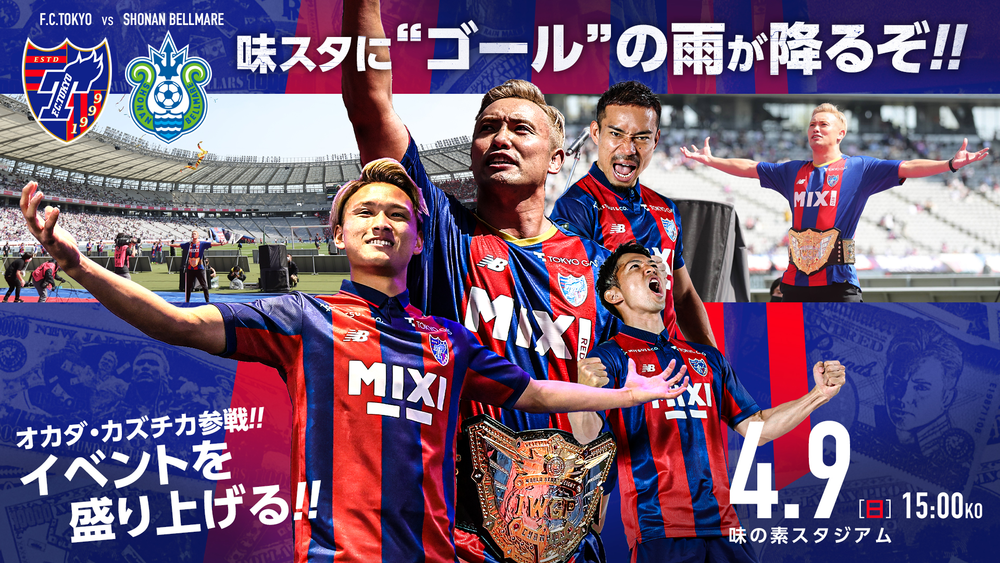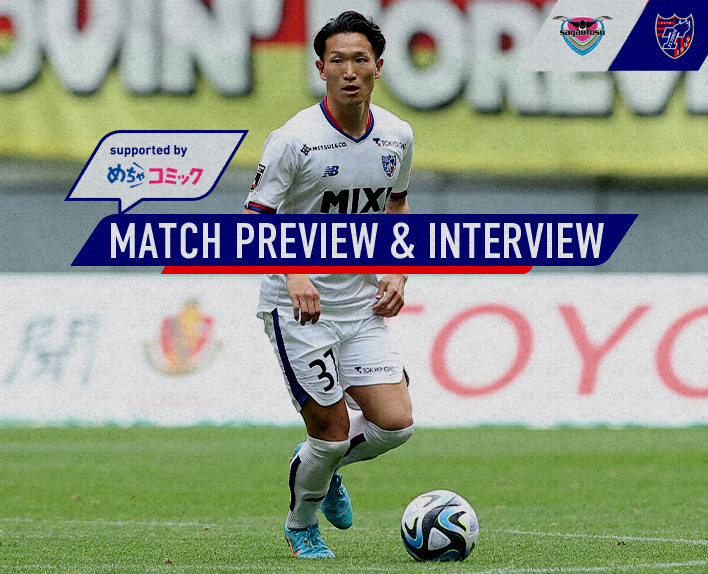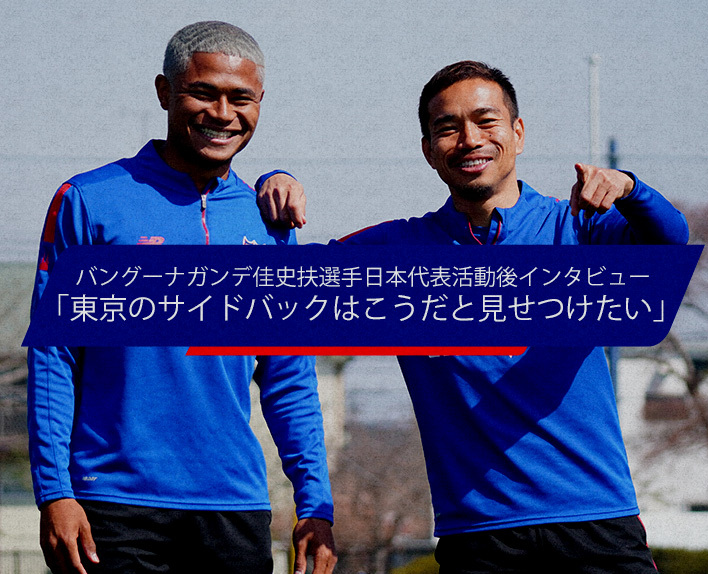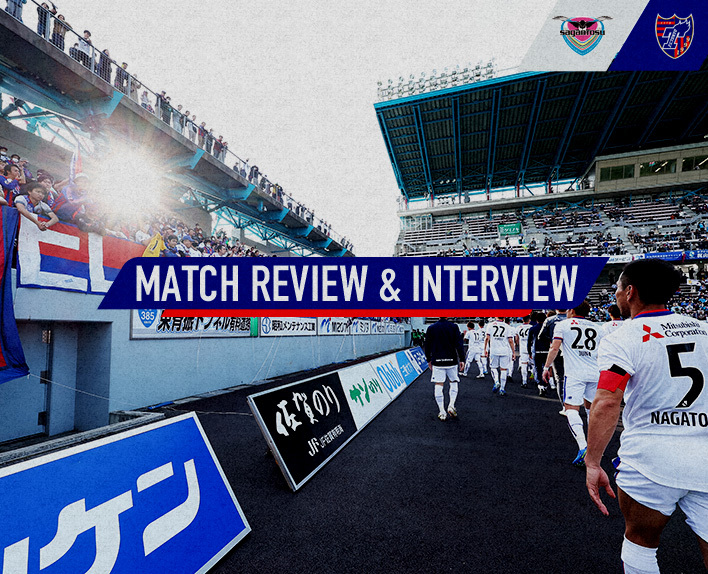Last Match - Nagoya Review
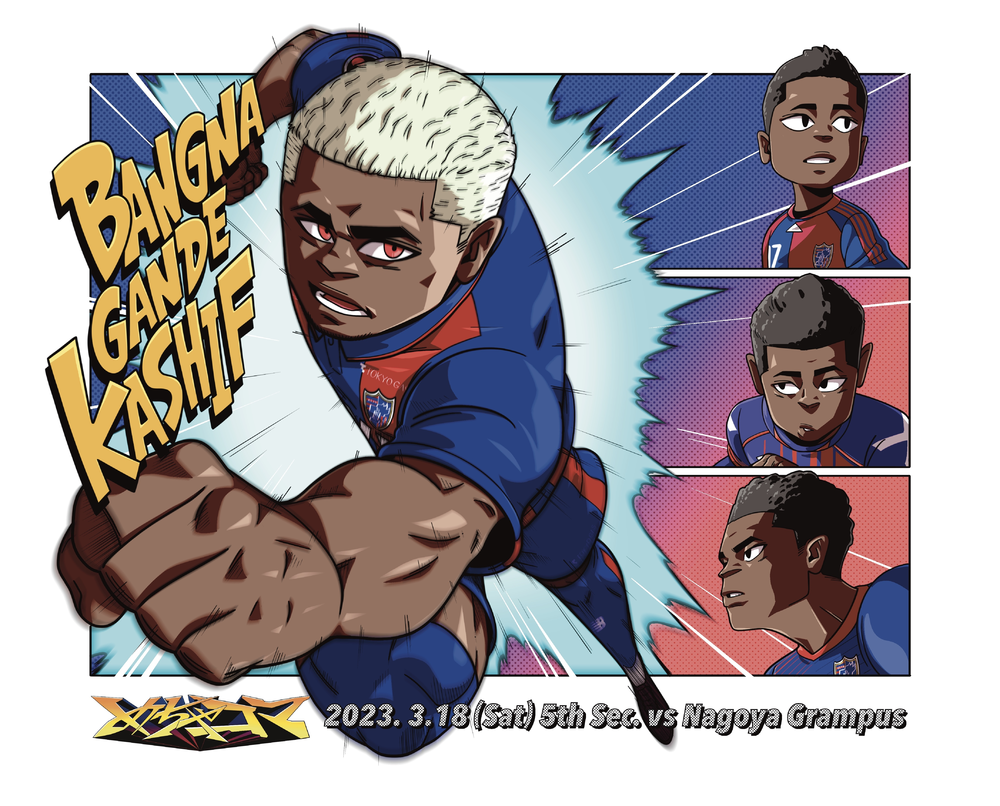
A match between Nagoya Grampus, led by Kenta HASEGAWA who brought the title to Tokyo, and the team that he coaches. Although the score did not change, it was a "tactical game" (Coach Albert) where both teams were cautious of each other's strengths. In this game, Kashif BANGNAGANDE, who was just selected for the Japan national team, showed his skills.
Tokyo also adopted a 3-back formation in the mirror game (where both teams have the same player configuration, resembling a mirror image) in order to be cautious of the opponent's strong counter attacks. At first glance, it may have seemed like a stalemate with few scenes in front of the goal. However, in each situation, both teams were fiercely trying to exploit even the slightest gap in their opponent's positioning and use their own attacking strengths to the fullest, resulting in a clash of sharp tactical thinking.
Tokyo collects the ball to Kashif BANGNAGANDE on the left side and searches for a way to attack the goal from the side, while Nagoya quickly counterattacks with their strong front three, exploiting the space behind Tokyo's aggressive play.
Tokyo was able to reach the cross ball, but they were unable to break through Nagoya's defensive net in front of the goal. On the other hand, they showed a defensive strategy of slowing down the counterattack with Jakub SLOWIK's fine saves and quick pressing back by the wing backs, lowering the accuracy of the counterattack opportunities.
This season, for rising star Yoshifu who has climbed up to the Japan national team, there were still challenges in terms of results, but it was an impressive match where he showed exceptional talent in the attack and defense on the left side, leaving an impression as a new star on the "blue and red" side.
<Preview>
There is no need to mention recent match records here, as it is clear that Sagan Tosu, regardless of being the home or away team, is a formidable opponent for Tokyo.
As Kei Koizumi, who joined from Tosu this season, has repeatedly mentioned, the styles of Tokyo and Tosu are very similar. They both focus on possession of the ball, making decisive passes in tight spaces, and scoring goals. Their style of play prioritizes attacking with the ball rather than defending.
This season, the team has struggled with a record of 1 win, 1 draw, and 3 losses, placing them at 15th. However, in his second season as head coach, Kenta KAWAI's tactics and organization seem to have matured.
If it is a similar style of match, the difference will be in the maturity of organization and tactics, or the difference in individual tactics.
In the former, coach Albert Puig Ortoneda is working on deepening tactics in his second season, aiming for the maturity of the organization that can create various attacking patterns and set up games. The situation is similar for Sagan Tosu, where coach Kawai is also in his second season, and the key will be who will take control of the ball and the game. Depending on the situation, the game result may also be affected by the strategy of "letting the opponent have the ball".
In the latter, Tokyo should have an advantage in terms of talent. They have a well-balanced team with veterans, mid-level players, and young players, as well as foreign players with strong individuality. However, considering the away game last season where they were overwhelmed in terms of ball possession and lost momentum, the strength of the players will also be a determining factor in addition to their individual abilities and tactics.
There, the key player is Koizumi, who has outstanding strength in the intensity of the ball. Koizumi, who believes in playing based on victory, considers winning in the intensity of the ball to be absolute. Can he surpass the opponent in the intensity of the midfield and tactically take advantage of his knowledge of his former team's fighting style? We can expect a great performance from Koizumi.
[Albert PUIG ORTONEDA Interview] 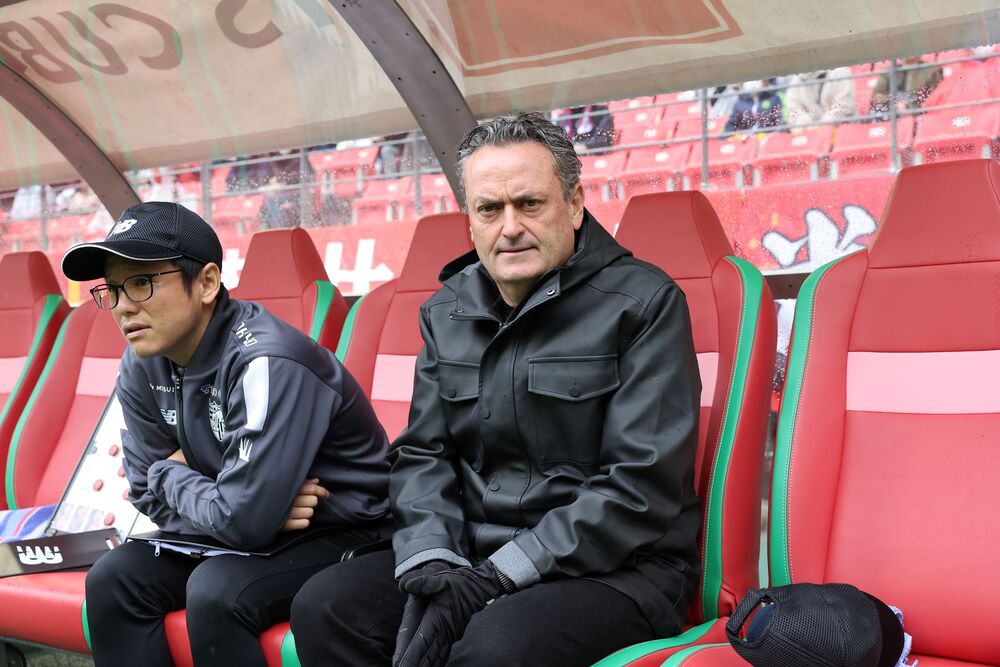
Q, Kashif BANGNAGANDE made his first cap for the Japan national team, did you see it?
A, I think I played well. I was calm and I think I was able to play with a good position, especially in the attack. I think I played well enough to be evaluated as the first game of the Japan national team.
Q, after 5 league matches, we have 2 wins, 2 draws, and 1 loss.
A, this season, I think we were able to start by clearly taking a step forward. However, we did not expect multiple players to be out of action afterwards. Matsuki's call-up to the U-20 Japan national team, combined with injuries, caused difficulties for the entire team. Due to these circumstances, we were unable to maintain continuity within the team. The season is long, so every team will face situations like this. Right now, we are in a difficult situation and we must overcome it firmly. In this difficult team situation, I want to accumulate as many points as possible and maintain a high position. The season has just begun, and I don't think our current ranking is bad at all. However, I believe that we must overcome this situation as a team, especially with players in the same position being absent at the same time.
Q, we were unable to win against Tosu last season and it was a tough match away.
A, last season, we struggled in matches against Tosu and Shonan. However, we finished the season with a higher ranking than them. We played against them when they were playing well and they surpassed us with good soccer. There were times last season when we were dominated by the midfield. We did not have a good game against Tosu. Tosu is a dangerous team that plays well when they give up the ball. In tomorrow's match, we want to fight for victory by concentrating and dominating the game.
Q, Tosu is currently on a 7-game losing streak in the league.
A, I think that is an interesting number. However, that number can be seen as evidence that despite Tosu's management scale not necessarily being large, they continue to demonstrate outstanding performance. Therefore, I believe it is a club worthy of respect. However, in the world of football, what is important is the final ranking at the end of the long league season.
Q, I think Matsuki's presence was significant when watching the Levain Cup.
A, I don't think I need to comment on the fact that I appreciate him. At the same time, I think everyone knows that he is a great player.
Q: There is a possibility that player Matsuki may be absent in May due to national team activities.
A, Kumada player will probably be called up as well. It can be seen as one of the successes when our players are called up to the Japan national team.
Q, won't there be an impact on the movement of support in the attacking third if player Matsuki is absent?
A, players Matsuki and Abe have a rich amount of physical activity and can sprint multiple times to press. At the same time, their play with the ball has also improved since last season. When these two are absent, we must approach the game by effectively utilizing players with different characteristics. Naturally, there is a clear style regardless of the players' characteristics. However, in each individual game, we must approach it considering their characteristics. If Matsuki and Abe are present, they can press with abundant physical activity and also make attacking runs. If these two are not present, it becomes my job as the coach to find alternative strategies and solutions.
[Player Interview]
<KeiKOIZUMIPlayer> 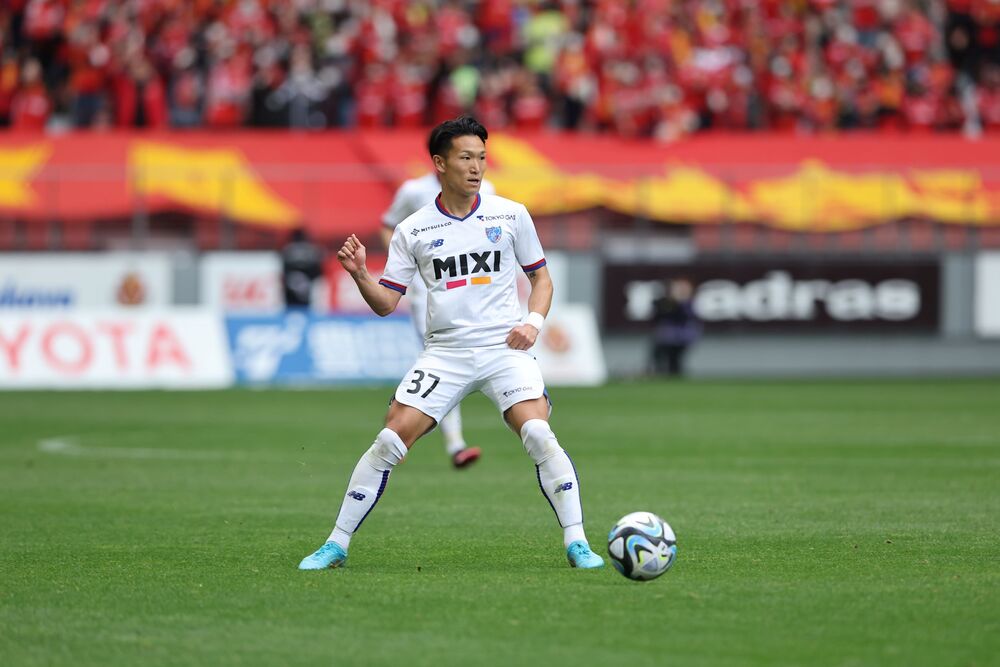
Q: How do you feel about the match against your former team, Sagan Tosu?
A, I'm really looking forward to it. I was with Tosu for a season and a half, and I have nothing but gratitude. I hope to play with a strong sense of gratitude. Regardless of the opponent, I am now a member of Tokyo, so I want to do what I can for Tokyo.
Q: Do you have any emotional attachment to playing against Tosu?
I'm looking forward to playing the game because all the players I played with are there. I can predict what kind of soccer they will play. I know the strengths and weaknesses of each player. I am excited, but I definitely don't want to lose, and right now I am only thinking about winning in Tokyo.
Q, what is the most important thing you want to focus on to move up in the rankings?
During the season, there are injuries and various things that happen. Whether it's better to connect all the balls or play simply also depends on the opponent, and there are definitely good and bad times. However, if we don't lose in terms of the intensity of play as the base of Tokyo, I don't think we will collapse. First of all, I hope we can fight firmly in the base, and if we can turn what we are doing in training into a positive, it would be great. If we can have confidence like in the Levain Cup Kyoto match and continue to challenge in terms of ball possession, I definitely think we will improve.
Q, how was your time in Tosu for one and a half seasons?
Although it may have been a short time of one and a half seasons, I believe it was a club where I could grow a lot as a football player. As a football player, I was able to learn a way of thinking that I had never had before through practice and matches. It was a team that was very particular about build-up play, so there were many challenges for me, and when I first joined, I was bewildered by how far we connected the play. I transferred from Kashima to a team with a different style, so I was confused at first and couldn't really showcase my abilities. Over the course of a year, working with Kenta KAWAI, the coach of Tosu, from the camp, I learned a lot about build-up, positioning, and more on the attacking side rather than defense. I was able to reaffirm the joy of playing football, and I received a lot of kindness from both younger and older players in Tosu. I feel grateful for the support, even though it was a short period of one and a half seasons, and I hope to express that through my play.
Q: How do you want to demonstrate what you have learned in the game at Tosu?
A, now that I am a member of Tokyo, I don't think it matters when I step onto the pitch. Tosu Stadium is a place that holds a lot of memories for me, and I hope to express that I am working hard here by playing with all my might in such a place. It is difficult to express gratitude through play, but I hope to fight with respect. Of course, since I have transferred, I don't know what others think. From the perspective of Tosu fans and supporters, some may think well of me for only being there for a season and a half before transferring, while others may not think well of me. Including all of that, I only have respect for Tosu, so I hope to approach it with that mindset and do my best.
Q: How was it when Shuhei TOKUMOTO, Junya SUZUKI, and Kei KOIZUMI, who are the same age, played together in the Levain Cup?
During the camp and before the Levain Cup matches, we talked about how the three of us might be able to play together someday. I was really happy that we were able to step onto the pitch together in the end. The presence of the two of them is undoubtedly significant, and I am greatly indebted to them both on and off the field. They are so reliable that they don't seem to be the same age as me. Tokyo has many young players, and I think the three of us are considered to be in the middle. We talked about how the middle players need to speak up more when we went out to eat. I hope we can continue to speak up while being conscious of that.
Q: Do you think it is a good balance for each character to have their own unique personality?
A, I think both of them are very reliable. I don't know about Tokumoto player, but I think his mental age is high enough that he doesn't look the same age as me.
Q: There is also an image of young players emerging, and the veterans and middle-tier players are also energetic. I think it will be even more exciting. What do you think?
A, we three, Ryoma WATANABE, Shuto ABE, and Hotaka NAKAMURA, as well as other players like them, I think that by leaving results in practice and in games, it will make both the upper and lower players feel the need to do more. I feel that the middle generation like us have to work hard.
Q: How do you feel about the presence and attitude towards training of Suzuki player?
In a world where only 18 players can be included in the team, there is a complex aspect of not being able to give everyone a chance no matter how hard they try. But that is also the reality. Even if Suzuki cannot get involved in the game, by seeing him shouting during practice or working hard in one-on-one situations, it makes the players who are not playing think that if the players who are not playing are doing this much, the players who are playing should do even more. I think that when I play in a game, I have to carry the feelings of the players who cannot participate. Of course, I have also been unable to make it to the bench before, but regardless of whether I play or not, I have learned the importance of not getting too excited and working hard. The players who play in the game definitely have to fight while carrying the feelings of those people, so I hope to do my best.
Q: Is it your mission to show your culmination in Tokyo?
A, I have really had various experiences. Being in my 10th year this year, it has been a significant experience to be able to play for various teams. I came here thinking that if I want to win titles, there is no other place than Tokyo. I hope to make use of my past experiences within the team and I believe that I have to demonstrate my abilities. Ultimately, no matter how good the soccer is, I believe that we have to win, so I hope to play with a strong focus on victory.
Q, I think Tokyo is also going through a process of change. Please tell us your enthusiasm for this season.
A, I think it's a time when Tokyo itself is also challenging since joining this season. I want to work hard together there, and I think everyone's goal is to win the title. This season, I want to challenge together towards that goal. If we are playing in the matches, we have to continue to produce results, otherwise we cannot keep playing. In that sense, I think we need to pay attention not only to the result of victory but also to visible numbers. The most important thing is for Tokyo to play in order to win.
<Koki TSUKAGAWA> 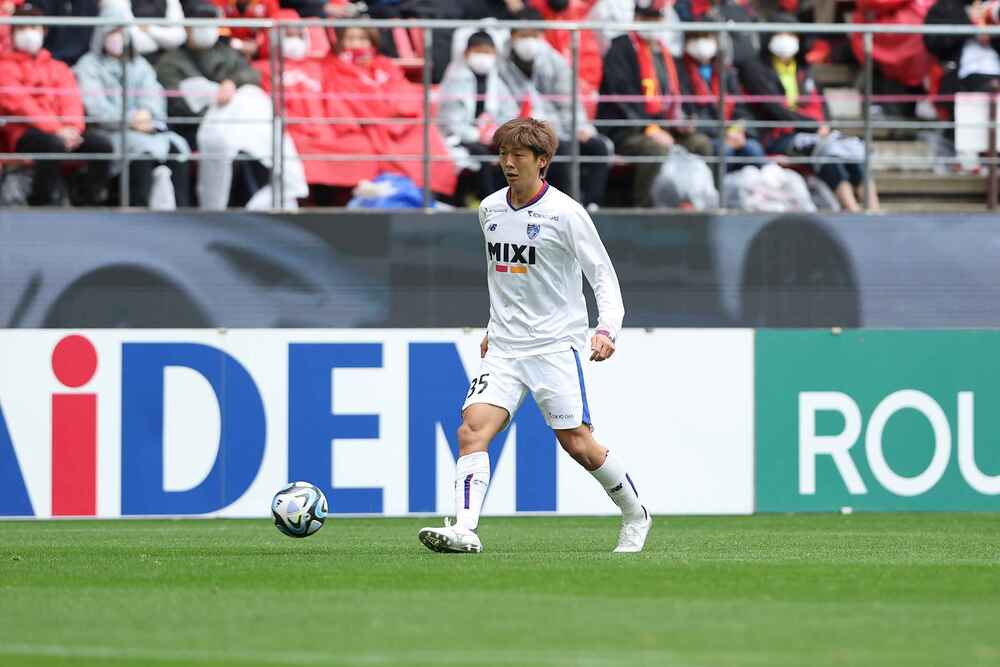
Q, What kind of play do you want to focus on in this tough situation where the number of injured players is increasing?
A, I have always been saying this, but I am committed to contributing to the team's victory while making plays that lead to goals.
Q: What preparations did you make for the Tosu match?
A, as the coach also mentioned, I think it's important for us to showcase our strengths. We ended last season with a disappointing result, so we have prepared to overcome that and want to express ourselves through our play. I believe it is also one of Tosu's strengths to not lose in the duels first and foremost. Additionally, it is important to consider how we can convert opportunities in front of the goal into goals. After winning the ball, I hope the team can make decisions together on whether to hold onto the ball or launch a quick attack.
Q, do you want to showcase your strengths in the attacking third?
As you said, I think it is important to know what you can do once you enter the attacking third. I hope to be able to demonstrate better in the game the final ideas and the ability to change decisions based on observing the opponent. I want to firmly connect this to the result in the Tosu match.
Q, I think it is important to stand firm here, even with the emergence of injured players.
A, even with injured or absent players, I think we have a strong team that can fill those gaps. We want to show it through our results. Although there are players who are absent, I think everyone sees it as an opportunity and I hope that if we can produce good results, it will create a positive cycle for the team.
Q, Do you need to leave an impact?
A, I think it is important to consistently show your strengths. The Tosu match will also be very important. I want to firmly seek results in each game.
Q: I think there were also appearances in positions that are not your main role. How do you feel about not being able to fully demonstrate your abilities compared to last season?
There are also parts that make me think. I think that is because of my lack of skill. In order for me to grow on a larger scale, I need to work on more challenges from practice. Even within myself, if asked if I was in great condition in the Kyoto match, the answer is no. I believe that I have no choice but to solve it as I continue to achieve results in the game.
Q, are you struggling with physicality and fitting into the team?
A, I would say that I am struggling, but I am challenging myself with new things in the team. Last season, we focused on connecting the ball together and were able to do it, but this season, various options have emerged, such as being able to connect the ball and also being able to launch a quick attack. It is necessary for the entire team to come together and decide what is best for each situation. I want to play while considering my position and being able to connect well. However, there are also parts where I think too much about it and my scale becomes smaller, so if I play while considering the balance well, I think I can grow more and the team will also improve.
Q, Tokyo has been unable to beat Tosu.
A, I want to win here to change the flow, and I want to play to firmly dispel the sense of weakness.
